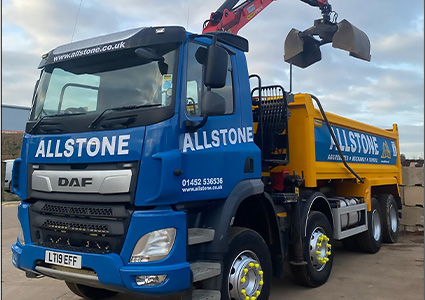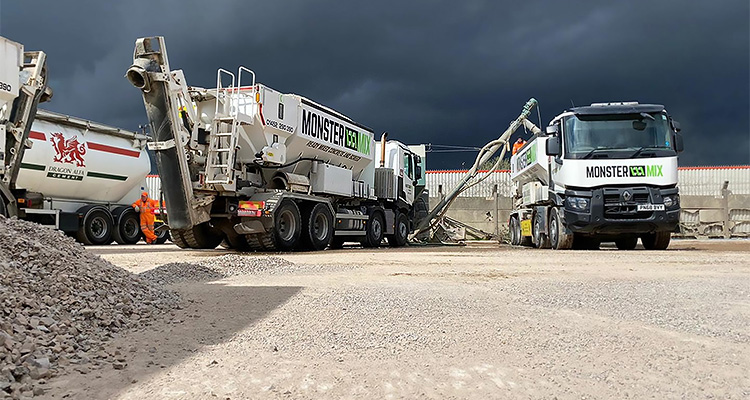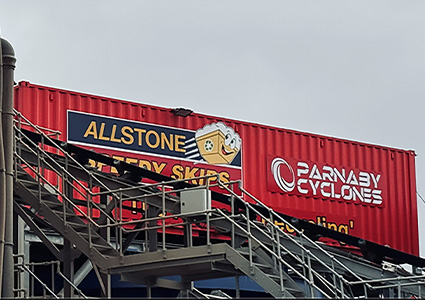How Allstone is leveraging its experience to execute an ambitious growth strategy
Allstone has been providing a trusted service supplying quality aggregates, skips and waste management services for over 40 years. Managing Director, Rowan Elliott, shares more detailed insight into the company: “Allstone is a family business based in Gloucester. Established in 1983, initially as an aggregate supply business, Allstone has grown organically over time. Via our main depot, located in the heart of the city of Gloucester, we provide waste recycling services which include a skip and waste recycling business, and an aggregate recycling operation where we recycle utility risings and construction / demolition materials to produce new aggregates. We also own and operate a quarry where we produce minerals and horticultural materials. Today, the business has a turnover in excess of £20 million and employs over 100 people.
 “We’re currently executing a buy and build growth strategy which led to the acquisition and vertical integration of Monster Mix, a local concrete business. Moving our recycled products into concrete to produce low carbon, sustainable materials locally is key to our strategy.
“We’re currently executing a buy and build growth strategy which led to the acquisition and vertical integration of Monster Mix, a local concrete business. Moving our recycled products into concrete to produce low carbon, sustainable materials locally is key to our strategy.
“Broadly speaking, the company’s operations can be broken down into three business divisions: waste and recycling, our aggregate production supply and merchant business, and now our concrete business. We provide skip services and waste recycling to homeowners and retail customers all the way through to large multinationals. We collect material and directly recycle up to 98 per cent of the waste received at our facility. Materials such as wood, plastics and metals are separated, and any residual material goes to a local energy from waste facility, powering homes, schools, hospitals and business. Finally, we receive the byproduct from the energy facility and turn it into sustainable aggregates too – it’s an amazing example of circular economies in action locally.
Investing in equipment
The second part of the business is centred around the production and supply of sustainable aggregates coupled with a more traditional, decorative aggregate business, supplying materials to local landscape gardeners and builders.
Receiving waste from utility companies and demolition projects, at our processing facility, we turn that material into new, recycled aggregates. Coupled with that, from our quarry, we process horticultural products such as topsoil, along with traditional sands for building and asphalt.
The third part of our business is focused on the production of low carbon concrete products. Following our recent acquisition of Monster Mix, we utilise our recycled aggregates in the supply of sustainable concrete products and services.”
To accommodate recent growth and facilitate further expansion, the company has made a series of significant investments. Rowan elaborates on the benefits this will bring the business: “The business has made significant investments over time. A multi-million-pound investment in the aggregate processing facility was completed in 2023; prior to that, there was a similar multi-million-pound investment in the waste recycling facility. We’ve also recently invested in a new waste shredder, which is so much more efficient than previous models that we’ve been able to replace two older machines with one new unit. In the coming year, we will be upgrading another three-to-four pieces of equipment as well as refreshing some of the Monster Mix assets. We’re constantly updating our equipment to make sure we are operating as efficiently as possible.”
Significant growth strategy 
Rowan then reflects on the challenges in the industry and how Allstone is positioned to overcome any subsequent difficulties: “Often it’s the same obstacles that everybody faces. The biggest challenge is economic uncertainty; you can plan for difficult times, but it’s the not knowing that makes things super difficult. If you look at it from a broader perspective, trading in construction materials has been difficult lately; the early part of this year has been challenging. We’re more of a local business than a multinational, but competition remains the same and we’re constantly faced with input cost increases. This makes it more challenging to give people the value they’ve come to expect. The only way that we can really prepare ourselves for that is to question every cost. This is also where the acquisition comes in. We needed to be more diverse and better insulate the business from external variables. This means that if one part of the business is not performing so well, we have other verticals to offset that position. Offering our customer base a larger range of products also increases our reach and helps mitigate the sector specific issues too should they occur.”
Rowan continues by highlighting the company’s priorities for the rest of the year: “We’ve established a set of targets that we want to exceed. Our priority is growth and there are projects in the pipeline that will help to boost those efforts. Whilst we’re doing that, we’ve got to make sure that we fully utilize the efficiencies that our investments are intended to deliver. To prepare for any future challenges, we’re also making sure the business is as lean as possible. This year, we’re likely to see considerable local investment, in terms of social housing projects, and tech construction projects, as well as some retail and other development activity. So locally there’s a lot of activity, which is very exciting for us.
“We’re two years into a strategy to double the size of the business in five years,” Rowan elaborates. “There’s a significant amount of opportunity and we’ve developed a strong and reliable foundation from which to pursue further growth. As we progress, we need to ensure we make the right decisions, at the right time, and move neither too fast nor too slowly. It is a balancing act,” he concludes. “We intend to stick to our strategy and if we do everything as planned, we will deliver significant growth.”

